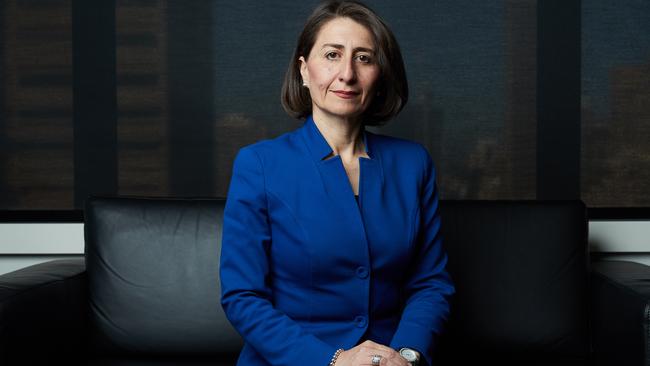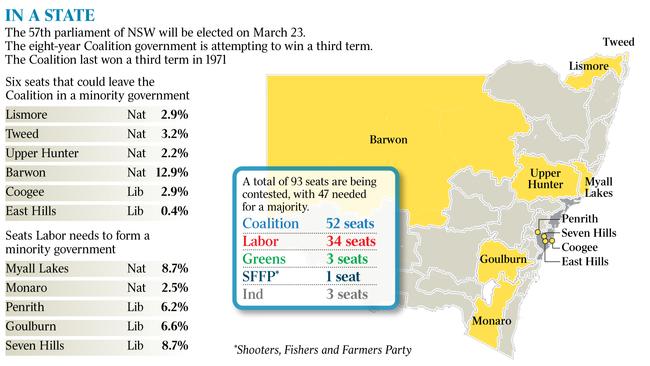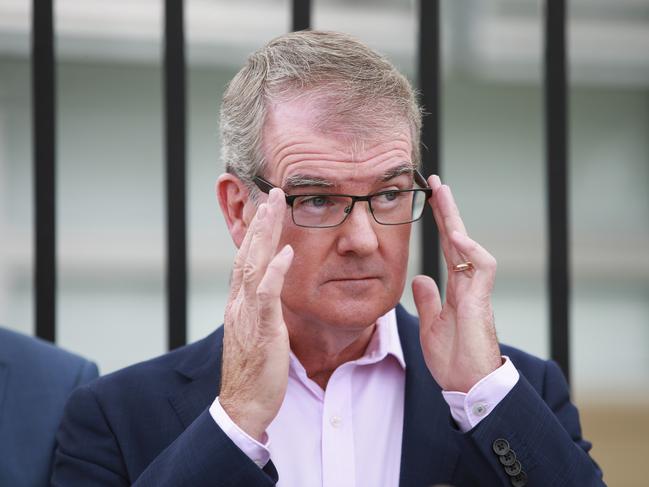Berejiklian’s struggle to win hearts and minds of NSW voters
Minority rule looms for NSW Premier Gladys Berejiklian.

Nick Greiner, the last NSW premier to fall into minority government after an election, feels for Gladys Berejiklian and the conundrum she faces at the March 23 state ballot.
“On any reasonable basis, she deserves to win and win easily,” Greiner says of the Premier whose government is stuck on only 50-50 in the polls despite a strong economy, budget surpluses and the state’s largest ever infrastructure program.
“I think this might be an unusual election because of (the situation) in some regional seats but generally when you go from No 6 state (economically) to No 1 state and you have got a big program going forward, you would hope you would do pretty well. That’s the realistic outcome.”
That said, Greiner deserved to win in 1991 too. He got 52.7 per cent of the vote, but won only 49 of the 99 seats — failing to win a majority. What followed was a tumultuous period of minority government in NSW, which saw a police royal commission set up and a scandal in which Greiner resigned after he sought to give independent Terry Metherell a job and was found to be “corrupt” by ICAC. That decision was overturned in the Supreme Court.
Greiner’s successor, fellow Liberal premier John Fahey, should have won in 1995. He got 51.2 per cent of the vote and still lost — by one seat — to Labor’s Bob Carr, who stayed in power for 10 years.
Fahey has his own reason for predicting Berejiklian will scrape over the line.
“There’s been a few hiccups with things like the light rail and the stadiums policy,” Fahey says. “It’s taken away the advantage of the government, but nobody can deny the … roadworks and rail lines being put down.
“The big difference (with 1995) and why I think she’ll get there is there’s always got to be a (credible) alternative.
“I don’t think the NSW public have forgiven the dreadful behaviour of the last Labor government, who were out of control.”
And this is the big advantage for Berejiklian: the scandals involving the alleged making of tens of millions of dollars, leading to the jailing of former ministers Eddie Obeid and Ian Macdonald, are still in the minds of many voters eight years on.
Liberals went down at ICAC too in 2014, including the former premier Barry O’Farrell, but not on the same scale as the Labor scandals.

Less than a month out from polling day, NSW voters have yet to tune in to the campaign, partly due to the dominance of Canberra issues ahead of the expected May federal election.
The most likely outcome at the NSW ballot appears to be a Coalition minority government.
This is despite the tens of billions the government is spending on infrastructure — $89 billion over the next four years — low unemployment and a bunch of handouts from government, including the announcement that Active Kids Rebates for kids would be increased from $100 to $200 a year.
Together with the Creative Kids rebate of $100 per child, this means a family with two children earning any amount of money can receive $600 a year from the state government for arts/music classes and sports club fees if Berejiklian is elected.
The government has built schools and hospitals — several of which have opened just in time for the election. It is building Australia’s biggest motorway, WestConnex and metro subway lines. But there are doubts about the necessity and cost of the light rail from the eastern suburbs to the CBD.
Berejiklian’s promise to rebuild two stadiums triggered the Labor slogan, “Schools and hospitals before stadiums”.
The Premier’s narrative and communication skills have also been questioned.
Summing up the frustration of the government, Deputy Premier John Barilaro likened public sentiment toward the Berejiklian team, particularly in regional NSW, to the character in Monty Python’s Life of Brian who asks: “All right, but apart from the sanitation, the medicine, education, wine, public order, irrigation, roads, a fresh water system and public health, what have the Romans ever done for us?’’
The 50-50 Newspoll indicates a 4.3 per cent swing from the 2015 election. If that’s uniform, Berejiklian’s six-seat buffer will disappear and minority government will emerge. Many of the losses are expected in the bush.
Regional voters believe the proceeds of large asset sales have not gone to the bush, despite rules that require a third of the proceeds to be spent in regional NSW.
It is not difficult to identify the five seats the government is struggling to hold. In the bush it is Lismore, Tweed, Upper Hunter and Barwon. In Sydney, Coogee has been all but written off; East Hills is on a very slender margin.
Then it will be a matter of whether Labor can snare Myall Lakes, Barilaro’s seat of Monaro, and a seat such as Penrith, Goulburn or Seven Hills to see if they can somehow form minority government.
If she loses six seats, Berejiklian will have to woo the likes of independents Alex Greenwich and Greg Piper to give her confidence and supply.
If the government loses nine or 10 seats, Labor has a chance at minority government with a mishmash of independents, Shooters or Greens. Labor needs to pick up 13 seats to govern in its own right — which looks improbable, though a month is a long time in an election campaign.
The Coalition used to be at a disadvantage in NSW because all the Liberal vote was locked up in the north shore. But thanks to Barry O’Farrell’s 2011 landslide, the Labor Party has had to do a lot more to come back from its 20-seat rump.
It lifted that to 34 seats in 2015 and hopes to get to what Opposition Leader Michael Daley calls the “Everest” of 47 on March 23.
Berejiklian tells The Australian she expects the election to go down to the wire.
“It’s the same I felt about it months ago,” she says.
“It’s going to be really tight. It will come down to a handful of votes in a handful of seats.
“Anyone telling you otherwise isn’t telling the truth.”
She won’t put her finger on a reason. “Gone are the days when there’s any answer to that question. Communities are very different; they have different aspirations.”
She refuses to buy into the real feeling that her majority — or even the election — could be lost in the regions.
“No, I think it’s going to be tight everywhere.”
She refuses to even comment on what might happen in a minority government.
“I have to stay focused on being a strong premier,” she says.
And she defends trying to spend her way to victory through the rebates policy, $2.8 billion for 5000 more nurses, $2bn for 4600 more teachers, and other big-spending promises.
“Well, what’s the point of having a strong budget position if you can’t (give to) the community?”
But the contrast is stark between former Liberal premier Mike Baird’s “Transform the State” mantra of 2015 — when he said he would sell half the electricity networks and rebuild the state — and the lack of narrative from Berejiklian.
The best she has come up with is the slogan “Let’s get it done” — which echoes former Labor premier Morris Iemma’s 2007 boast: “More to do but heading in the right direction”. Apparently it tested well in the focus groups.
Privately some in government are clinging to the idea that three or four seats will be lost and they can somehow scrape to a majority.
If that doesn’t happen, you can bet the problems around the federal Liberals will be blamed, although flyers have started appearing in the seat of Penrith exploiting Bill Shorten’s asylum-seeker policy woes.

If there were to be a bad result, there are also reasons to blame previous premiers — O’Farrell, for failing to move quickly enough on the transport infrastructure projects; and Baird, for banning greyhounds and amalgamating councils, causing a political firestorm in the bush.
Baird and then Nationals leader Troy Grant lost the safe seat of Orange to the Shooters in 2016 and Berejiklian lost the seat of Wagga Wagga to an independent in a by-election last year after Daryl Maguire was accused of corruption at ICAC.
Daley says a “real mood for change” exists in the regions.
“I want to make sure we get elected on what we are going to do, not (just) elected on a wave of discontent,” he adds.
“What does encourage me as we go around the state, particularly in the regions, and there’s a lot of recurring themes — a (view that) the Premier’s very stubborn and the Libs and Nats dictate to communities.
“I think that’s a hangover from 2011, when they had too much power and Barry was in charge. He wasn’t a premier’s bootlace, just a (former Liberal) state director who became premier. They haven’t learned from that.
“I think it’s there for the taking at the moment. I think it will be won or lost in the last month (of the campaign).”
The bush is the challenge.
In the Barwon electorate, the anger is palpable. In Broken Hill, men, women, people from all walks of life complain about the fish kill in the Menindee Lakes and how the government has failed to look after the Darling River.
“I won’t be voting for any of the major parties,” Steve Millington tells The Australian.
“They’re very Sydney-centric. Berejiklian … is wasting money on stadiums.”
Michelle Stephens describes the government’s management of the river system as “disgraceful” and her friend Sylvania Millard says: “It’s not just the environment, a lot of people (used to) go skiing and fishing … the city people are OK. They can have that.”
Richard Evans and Lynn Piper say politicians blame drought for the fish kills and low water levels in the Darling River and Menindee Lakes. “It’s the cotton farmers,” Piper says.
Diana Ferry says she will vote for the Shooters candidate and will hand out how-to-vote leaflets for him as “the Nationals, Liberals and Labor are all implicated in the mismanagement of the Darling River and the Murray-Darling”.
“I’m having to back a party that’s about killing animals as a way to save fish,” Ferry says.



